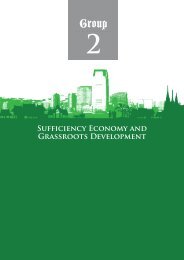Conflict, Legitimacy and Government Reform: Equitable Allocation of ...
Conflict, Legitimacy and Government Reform: Equitable Allocation of ...
Conflict, Legitimacy and Government Reform: Equitable Allocation of ...
You also want an ePaper? Increase the reach of your titles
YUMPU automatically turns print PDFs into web optimized ePapers that Google loves.
<strong>Government</strong> <strong>and</strong> Political <strong>Legitimacy</strong><br />
Conceptual Framework on the Implementation<br />
<strong>of</strong> Human Rights: A Case Study from Human<br />
Rights Violations During the War against Drugs<br />
<strong>of</strong> 2003<br />
Suchart Wongsinnak 1<br />
Today’s challenges on governmental<br />
power by claiming human rights is<br />
visible throughout the world as<br />
democratic states bind themselves to<br />
international human rights principles. At the<br />
very least, democratic states do not accept<br />
br<strong>and</strong>ing by global society as violators <strong>of</strong><br />
human rights. For this reason, human rights<br />
are one type <strong>of</strong> criteria used to evaluate the<br />
government’s use power to ensure compliance<br />
with moral <strong>and</strong> legal principles. Driving<br />
human rights for the aforementioned goal is<br />
not only a matter <strong>of</strong> state, which once was<br />
the center <strong>of</strong> law enforcement. On the<br />
contrary, human right activists become<br />
individuals with key roles in taking human<br />
1 Ph.D. in Criminology, Law <strong>and</strong> Society, University <strong>of</strong> Florida. He is currently a<br />
litigation <strong>of</strong>ficer attached to the Administrative Court Officer.<br />
129














